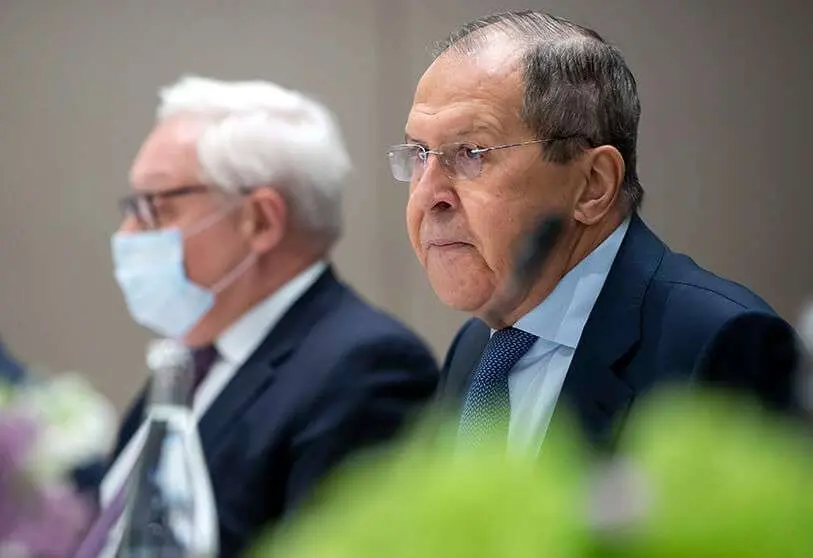Russia warns of "grave consequences" if US ignores security requests

Despite the fact that the recent meeting between Antony Blinken and Sergey Lavrov ended without any agreement on the current situation in Ukraine, both diplomats advocated maintaining bilateral dialogue.
During the meeting, the Secretary of State announced that Russia would receive a response on its security demands next week. In addition, he again condemned Russia's military deployment near the Ukrainian border. "If Putin wanted to, he could attack Ukraine from the south, east and north," he said. As Biden has warned on several occasions, Blinken said that Russian aggression in Ukraine would provoke a "united, swift and severe response".
In contrast, Lavrov insisted that Russia has "no plans to attack Ukraine". During the press conference afterwards, the Russian diplomacy chief accused the West of promoting "hysteria" and NATO of "fomenting Russophobia". The minister highlighted NATO's military manoeuvres in Eastern Europe and arms supplies to Ukraine.

Commenting on Washington's response on Russian security requests, the foreign ministry said in a statement that "further ignoring Russia's legal concerns will have the most serious consequences", Russian news agency TASS reports. "It can be avoided if Washington responds positively to our draft agreements on security guarantees," the ministry's note adds.
Moscow has repeatedly called for limiting NATO's military expansion and activities towards its borders. The US response, a State Department official told The Washington Post, "will continue to fall short of Russia's demands to suspend NATO's open-door policy".
The official, speaking on condition of anonymity, also reported that "the Biden administration's written response will include US security proposals and demonstrate Washington's interest in continuing the dialogue," the US newspaper adds.

During the NATO-Russia Council summit in Brussels last week, the United States already expressed its rejection of Moscow's demands. "We will not accept that NATO cannot expand further," said US Deputy Secretary of State Wendy Sherman. In response, the Russian delegation remarked that they would not accept that NATO could expand further.
Russia, in addition to the withdrawal of foreign forces in neighbouring countries, has demanded a "return to the 1997 configuration", calling for the expulsion of Bulgaria and Romania from NATO, reports The Moscow Times. Both Sofia and Bucharest have condemned Moscow's statements as "unacceptable" and recalled that both are sovereign countries. "We made our decision to become a member of NATO a long time ago," Bulgarian Prime Minister Kiril Petkov stressed.
While Russia awaits the US response, several NATO countries have begun sending troops and military hardware to Eastern Europe. These moves fortify the Alliance's structure and protect Kiev, but also raise tensions with Moscow.
Spain has decided to send the warships Blas de Lezo and Meteoro to the Black Sea. The government of Pedro Sánchez has also offered its fighter jets for deployment in Bulgaria. In this regard, Madrid does not rule out increasing the number of Spanish troops in the area either. According to Ministry of Defence figures, Spain has already deployed more than 300 army soldiers in Latvia.

In this regard, the UK has sent 30 elite troops and 2,000 anti-tank weapons to Ukraine. British surveillance aircraft have also been reported flying into Ukrainian territory. However, despite British military supplies, London and Moscow could hold diplomatic talks in February, according to the Times.
Meanwhile, German Defence Minister Christine Lambrecht announced that Berlin will send a field hospital to Ukraine in February. "We are on Kiev's side," Lambrecht reiterated.
Germany, however, has prevented Estonia from sending German-origin military support to Ukraine, The Wall Street Journal (WSJ) reported. Tallinn, like the other Baltic republics, has promised Kiev to send reinforcements in the face of possible Russian aggression.

Unlike other countries, Berlin has refused to send arms directly to Ukraine. "Germany has not supported the export of lethal weapons in recent years," German Chancellor Olaf Scholz told a press conference.
The European Union has announced its readiness to swiftly sanction Moscow should it resume its aggression against Ukraine. The sanctions package has been negotiated between Brussels, London and Washington, and would affect trade and economic relations with Russia.
"The expected blow is of such magnitude that, according to the same sources, Brussels has also prepared contingency plans to mitigate the damage that would inevitably also be suffered by the European economy," reports Bernardo de Miguel, a journalist with El País from Brussels. EU officials also stressed that a Russian attack on Ukraine "would be a response to the greatest security challenge facing Europe since the end of the Cold War".

Kiev, for its part, has already passed a decree to impose sanctions on several Russian companies. The companies affected are construction companies Lenpromtransproyekt and Geozemstroy, as well as a Russian insurance company, Insurance Business Group.








